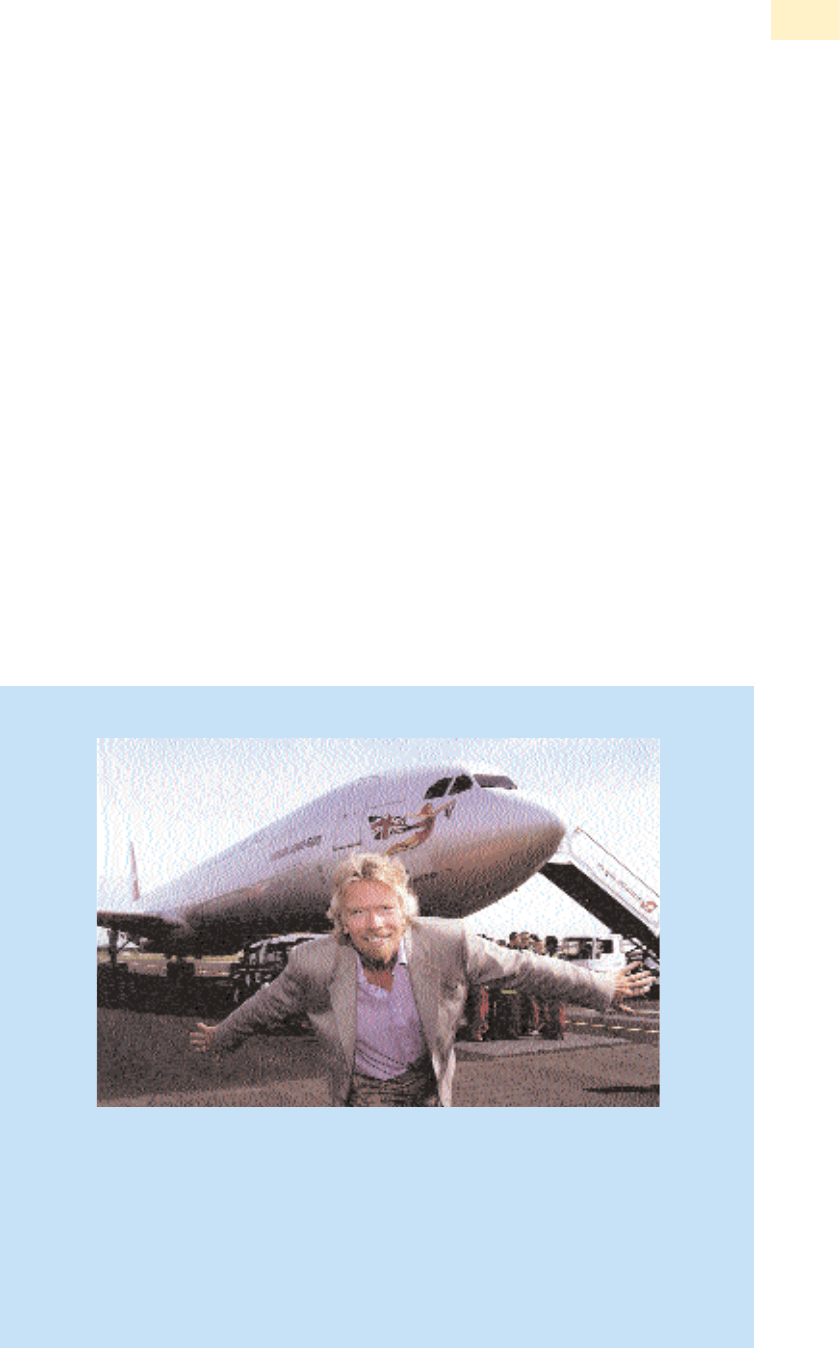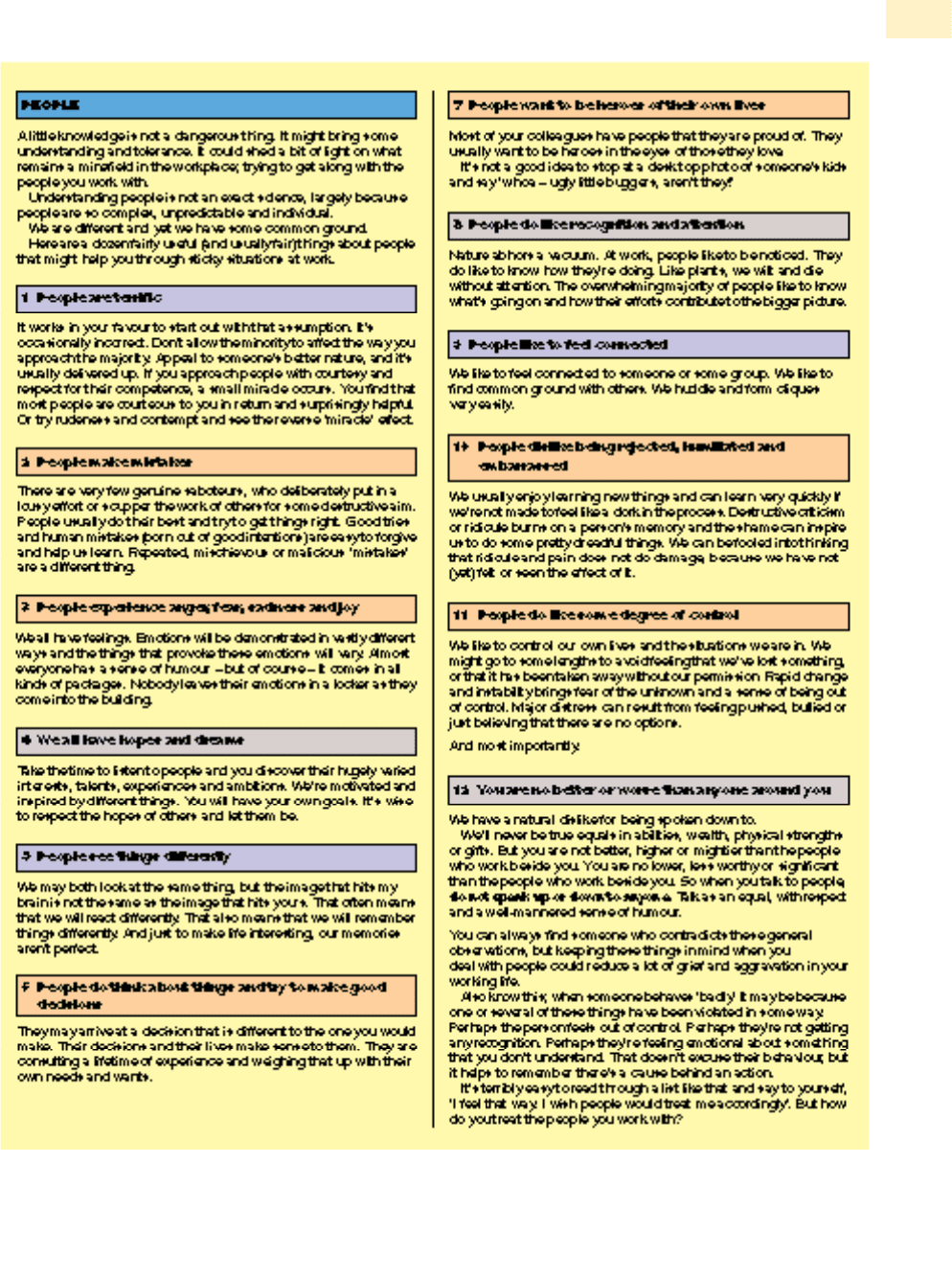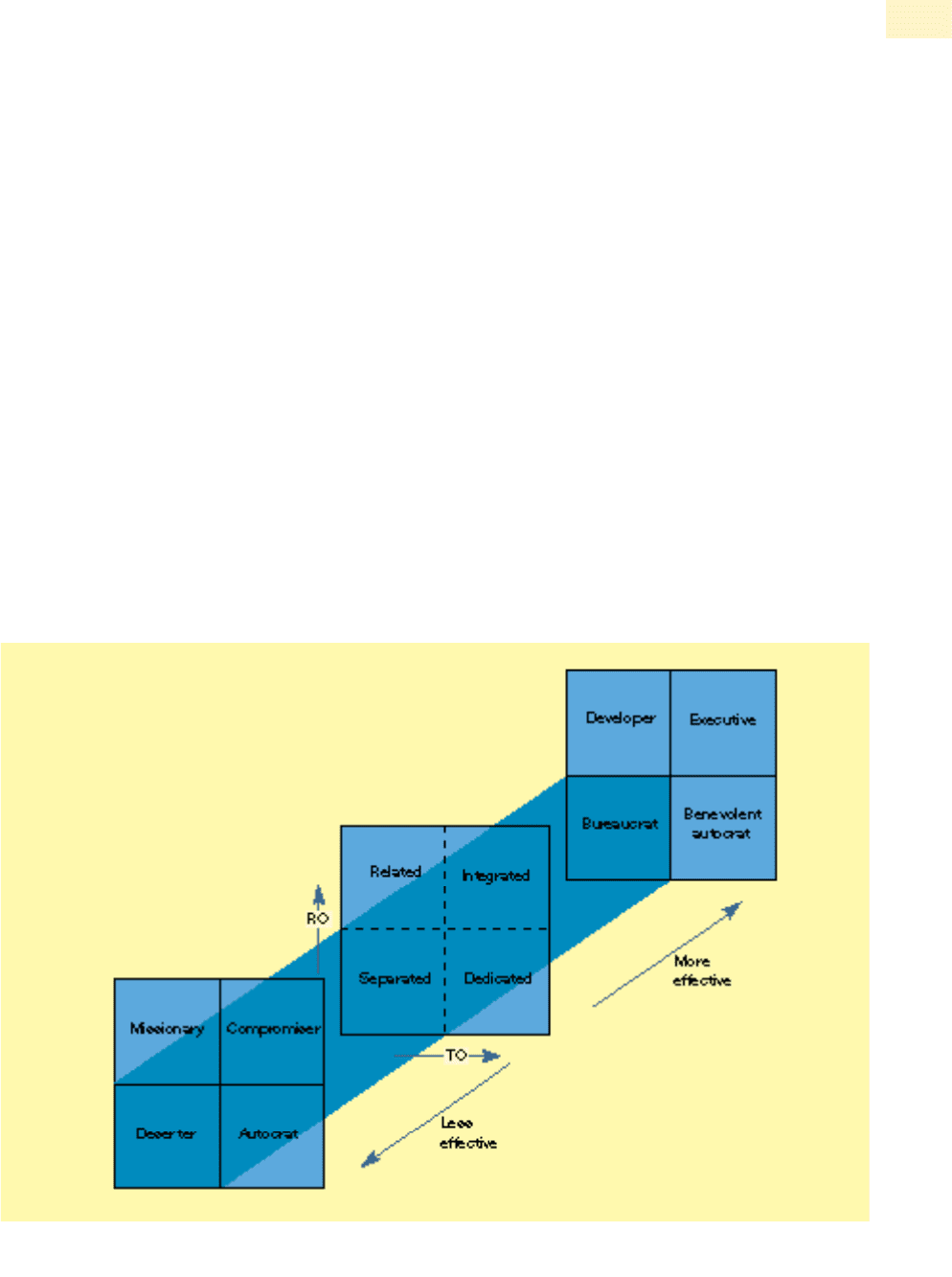Mullins L.J. Management and organisational behaviour, Seventh edition
Подождите немного. Документ загружается.


job, it is right that managers should ensure that time-keeping is adhered to and
enforced as appropriate. But in many cases rigid times of attendance are not an essen-
tial requirement for effective performance.
Who makes the greatest contribution to the work of the organisation? Person A
who is always on time, keeps to the exact lunch break and never leaves early (or
late), but spends much of the day in idle conversation and gossip, shuffling papers
and looking at the work, and achieves only adequate performance? Or Person B
who may ‘not be seen about the place so much’, but always gives maximum
effort, makes full use of time and is never idle, is flexible, delivers whatever is
expected on time, and achieves a consistently high level of performance?
Good time-keeping can be an important part of the job. However, if ‘always being there’
is not a requirement, per se, for effective performance, what is to be gained by insisting on
rigid times of attendance? Such a requirement is likely to be perceived by Person-B-type staff
as an unwarranted bureaucratic style of management. Furthermore, it could turn a Person B
into a Person A – with an adverse effect on the level of effective performance. The increasing
movement to flexible working patterns and teleworking coupled with demands to boost pro-
ductivity are placing growing emphasis on what staff actually achieve rather than the time
spent at work. The important criteria are the level and quality of performance.
The starting point for customer, or consumer, satisfaction is good manager–subordinate
relationships. Supportive and harmonious working relationships are more likely to
create a working environment which results in high levels of both staff and consumer
satisfaction. Managers need to adopt a positive attitude towards staff and to develop a
spirit of mutual co-operation. Staff should feel that they are working with the manager
rather than for the manager.
CHAPTER 7 MANAGERIAL BEHAVIOUR AND EFFECTIVENESS
255
Staff and
customer
satisfaction
Make all staff part of the management team
■ Virgin pays some of the lowest salaries in the industry yet its staff are very talented and
loyal –paradox?
■ The company’s success in this field is down to Sir Richard’s (Branson) management phi-
losophy where all staff feel valued and Branson is just as interested in a flight
stewardess’s opinion as he is in his Marketing Director’s.
■ Successful people management is about inclusion and Branson works on making all his
staff like a team where each is valued not only for fulfilling their job remit but for con-
tributing to the development of the business as a whole.
The Virgin Factor
35
Photo: Virgin Atlantic Airways

From a further examination of several well-performing firms in America, Waterman
draws attention to organisational arrangements as the key, achieved from a humanist
rather than a ‘business process re-engineering’ viewpoint. Successful firms are organ-
ised to meet the needs of their people so that they attract better people, who are more
motivated to do a superior job and better organised to satisfy the needs of their cus-
tomers. Firms need to manage the intricate interplay between people, strategy,
organisational arrangements and customers. The conclusion is ‘people first’. Treat your
own people and your customers well and good results will follow.
36
Some might argue that these philosophies are too idealistic and that given the harsh
realities of the working environment managers need to adopt a more dominant stance.
However, it is not suggested that managers should in any way give up the right to
manage: it is a question of how they manage and how they use their authority –
for example, a ‘Theory X’ style with emphasis on direction and control, and the use of
rewards and sanctions exercised by nature of the manager’s position and authority; or a
‘Theory Y’ style in which individuals may satisfy their motivational needs through
integration with meeting the goals of the organisation.
Management may also be based on ‘organisational power’ derived from status or
position within the hierarchical structure, and the use of formal authority; or ‘personal
power’ derived from competence and expertise, identification with subordinates, com-
manding respect, and urging and encouraging people in the performance of their
tasks.
37
Green contends that most successful managers are able to adjust their approach
and response between a continuum of hard skills and soft skills, and react appropri-
ately to different situations.
38
The nature of people at work
Galunic and Weeks refer to the changing nature of the employment relationship and
that developing people, not just managing them, has become a necessary yet tricky
task. Fortunately, however, some things have not changed.
Human nature remains remarkably stable. People want to feel competent and secure, they are
consistent in reciprocating good or bad deeds; and they are influenced by, and often imitate,
behaviours that surround them. Nothing changes from the sandpit to the boardroom, so man-
agers should revisit these truths as they think about investing in people.
39
Echoing the views of the author, Walmsley sets out a number of features about trying
to get along with people you work with.
40
(See Figure 7.6.)
One example of an interesting and enlightened people approach is put forward by
Mary Kay Ash, founder of the huge, multi-million-dollar company Mary Kay Cosmetics
in the USA.
41
Ash writes about the intentional development of a management concept that allows
fairness to flourish in business, the belief that people will shine if given a chance, and
methods that are applicable to any organisation. Her concept of the management of
people is based on the Golden Rule ‘Do unto others as you would have them do unto
you’, with emphasis on being a ‘people company’. (Again, this is a philosophy very
much in line with the views of the author.)
People come first at Mary Kay Cosmetics – our beauty consultants, sales directors and employ-
ees, our customers, and our suppliers. We pride ourselves as a ‘company known for the people it
keeps’. Our belief in caring for people, however, does not conflict with our need as a corporation
to generate a profit.
42
256
PART 3 THE ROLE OF THE MANAGER
CHOICE OF MANAGERIAL STYLE
Golden rule
management

CHAPTER 7 MANAGERIAL BEHAVIOUR AND EFFECTIVENESS
257
Figure 7.6 How to get along with people you work with
Reprinted with permission from Cheryl Walmsley, Your Future Looks Bright, Preston Beach (2002), pp. 38–40.

The philosophy of ‘Golden Rule Management’ is applied in such ways as, for example:
■ Treat people fairly but according to merit. In order to balance responsibilities to
the company, the employee, and all other employees, every manager must be able
to say ‘no’. But employees should be encouraged to turn a ‘no’ into the motivation
to accomplish more.
■ However busy you are, make the other person feel important, and let people know
you appreciate them.
■ Motivate people through giving praise. A good manager must understand the
value of praising people to success.
■ Encourage feedback and don’t undervalue the ability to listen.
■ Sandwich every bit of criticism between two layers of heavy praise.
■ An open-door philosophy.
■ Help other people get what they want – and you will get what you want. Good
managers’ success is reflected in the success of their people.
■ Never hide behind policy or pomposity.
Beauty consultants who follow the guiding rules of Mary Kay Cosmetics are rewarded
by the incentive of expensive gifts.
258
PART 3 THE ROLE OF THE MANAGER
It’s a people thing
Calls for humane management are not new, but some companies have been slow to
respond writes Victoria Griffith.
T
he most striking feature about Rosabeth Moss
Kanter’s book, On the Frontiers of Management, is
that much of the material sounds so familiar: valuing
and empowering employees; moving to flatter, less hier-
archical organisations; and encouraging creativity.
The familiarity of the material is, in part, testament to the
author’s prominence in the field of management theory. It is
also an indication of the age of some of the writings: the
book is actually a collection of essays written over the past
15 years. All the essays have been published in the Harvard
Business Review, which Kanter edited from 1989 to 1992.
Yet Kanter, a Harvard Business School Professor, makes
no apologies. ‘I didn’t want to have to come up with some-
thing new – some clever metaphor or whatever – because,
in the end, I’m still really preaching what I was a decade
ago,’ she explains. ‘The reason it needs to be said again is
that most corporations still haven’t listened,’ says Kanter.
‘Managers may say they’re empowering employees, for
instance, but how many are really doing it?’ Back in 1983,
much of what she wrote was considered radical, she says.
‘Now it’s almost mainstream. I was really at the cutting
edge of new management theory, but it wasn’t just a fad.
My writings offer enduring lessons.’
Kanter’s gospel of a more humane management style
has gained many prominent adherents, including Raymond
Smith, chief executive of Bell Atlantic, the telecommunica-
tions group. She exerts wide influence as a consultant,
having just, for example, advised British Airways on its
globalisation strategy.
Yet events have got in the way of her teaching, Kanter
complains. The global recession of the early 1990s dis-
tracted much of the corporate world: it turned from focus-
ing on employee empowerment to restructuring.
‘The recession side-tracked managers,’ says Kanter.
‘When unemployment was so high, corporations started to
think “Why should I care about my employees? There are
plenty more available if they want to walk out the door”.’
An important lesson of the recession, says Kanter, is that
even when labour is abundant, companies cannot afford to
ignore their workers. She cites the example of Wal-Mart, the
US discount retailer, which, even at the height of the reces-
sion, cultivated employee loyalty by offering superior pay
and benefits. ‘That was one secret of the company’s suc-
cess. Even unskilled employees are not interchangeable.’
Kanter is hopeful that companies will at last heed the call
for more sensitive management. Change in the US is being
driven by the move away from manufacturing to a service-
based economy, she says. And service industries, she
points out, depend on their employees to give them a com-
petitive edge.
Only corporations that pay attention to their workforce
will move ahead.
This is true, says Kanter, even for the most basic service
industries, ‘Even McDonald’s, which was so heavily criti-
cised for creating ‘McJobs’ that failed to value the
individual, has had to change its ways.’
‘The company was pushed to do so because of falling
market share and profitability. There is knowledge in the
hands and minds of experienced workers, even those of
burger flippers, which boosts productivity.’ Kanter also
believes many corporations have failed to embrace her
ideas for another reason – human nature. ‘At some point in
EXHIBIT 7.1
FT

The importance of managerial performance and effectiveness has long been recognised
by major writers such as, for example, Drucker who, originally in 1955, propounded that:
The manager is the dynamic, life-giving element in every business. Without their leadership ‘the
resources of production’ remain resources and never become production. In a competitive econ-
omy, above all, the quality and performance of the managers determine the success of a
business; indeed they determine its survival. For the quality and performance of its managers is
the only effective advantage an enterprise in a competitive economy can have.
43
The importance of management performance has also been recently emphasised by Foppen:
Management is of pivotal importance for modern society. It is for this reason that, no matter what,
thinking about management, certainly at university level, is of great relevance to management prac-
tice. So apart from the question of whether management’s claim that it is indispensable is really
valid or not, the fact that practically everyone believes it is, is what counts.
44
CHAPTER 7 MANAGERIAL BEHAVIOUR AND EFFECTIVENESS
259
our lives most of us have had a tendency to be short-
sighted, territorial and averse to change,’ she says. ‘It takes
years to make a difference. People need to see successful
models before they want to follow the same path.’
Kanter has few regrets about her early writing but does
complain that her arguments on core competencies have
been widely misunderstood. Kanter argued early on that
corporations should stick to what they are best at, rather
than moving into entirely new areas. Some observers have
interpreted that as an argument against change.
‘Of course I’m not change-averse – being amenable to
change is a large part of what I advocate,’ says Kanter. ‘I just
meant that companies shouldn’t take great leaps into new ter-
ritory if it means short-changing their core activity.’ Kanter
points, for example, to the conglomerate Samsung’s desire to
move into car manufacture and computer chips simultane-
ously. ‘They are such different things; it’s hard to believe they
will have the resources and expertise to do everything well.’
Ideally, Kanter believes that change should become so
much a part of management routine that large changes
become almost imperceptible. ‘Many small changes add
up to a big change. But if it’s done over time, the transition
will be much smoother.’
While Kanter defends the continued relevance of her
early writings, she concedes that the corporate world is
very different, in some respects, than it was 15 years ago.
The Internet, for example, is changing the nature of the pri-
vate sector. Many view the Internet as an impersonal forum
that reduces human contact. It would follow that corpora-
tions might stop focusing on their employees in favour of
databases and technology.
Yet Kanter prefers to see cyberspace in a different light.
‘It is, more than anything, another means of communica-
tion,’ she explains. ‘By e-mailing people, we strengthen
existing relationships. So the Internet may make a more
humanistic management style more possible then ever
before.’ As an example, a corporate Intranet can be used
to disperse power from headquarters to the company’s
periphery – the distributor in Hong Kong, or the branch
office in St Louis. ‘By linking everyone up by computer,’
says Kanter, ‘you encourage the flow of ideas from the
margin. In opening up the lines of communication, the
centre is saying “Hey, we want to hear from you”.’
While times have changed, the heart of Kanter’s mes-
sage does not need updating. ‘I think we already know a
lot about what should be done’, she says. ‘Now managers
just have to go do it.’
(Reproduced with permission from the Financial Times Limited, © Financial
Times)
MANAGERIAL EFFECTIVENESS
A major international study undertaken by Proudfoot Consulting reports that poor planning and
inadequate management are still the key reasons for the majority of time wasted globally in the
workplace. The study comprised more than 1300 detailed analyses ofcompanies in seven
countries complemented by an independent opinion poll of 2700 chief executive officers. The
findings show that poor management in terms of inadequate planning and control, and insuffi-
cient day-to-day supervision of work is still the largest single reason for lost productivity. In the
UK 27% of all lost time was due to inadequate management and supervision, either because
managers were unavailable or ineffective.
Proudfoot Consulting
45

The overall responsibility of management can be seen as the attainment of the given
objectives of the organisation. Upon the attainment of its aims and objectives will rest
the success and ultimate survival of the organisation. There is therefore a clear and
important need for effective management. And this need is just as strong in public sector
organisations as in private enterprise organisations. Indeed, it could be argued that in
local government, for example, the accountability of public servants to elected members
for their actions means that professional standards of management of the highest order
are even more essential.
46
Whether in private or public sector organisations, however,
managerial effectiveness is a difficult concept both to define and to measure.
Managerial efficiency can be distinguished from managerial effectiveness.
Efficiency is concerned with ‘doing things right’, and relates to inputs and what the
manager does.
Effectiveness is concerned with ‘doing the right things’, and relates to outputs of
the job and what the manager actually achieves.
To be efficient the manager must attend therefore to the input requirements of the
job – to clarification of objectives, planning, organisation, direction and control. But in
order to be effective, the manager must give attention to outputs of the job – to per-
formance in terms of such factors as obtaining best possible results in the important
areas of the organisation, optimising use of resources, increasing profitability, and
attainment of the aims and objectives of the organisation.
Effectiveness must be related to the achievement of some purpose, objective or task
– to the performance of the process of management and the execution of work. Criteria
for assessing the effectiveness of a manager should be considered in terms of measuring
the results that the manager is intended to achieve. But what is also important is the
manner in which the manager achieves results and the effects on other people.
This may well influence effectiveness in the longer term. Managerial effectiveness
results from a combination of personal attributes and dimensions of the manager’s job
in meeting the demands of the situation, and satisfying the requirements of the organ-
isation.
Stewart suggests that effectiveness is more important than efficiency.
Managers who want to improve should review both their effectiveness and their efficiency.
Effectiveness is doing the right things. Efficiency is making the most economic use of the
resources. Effectiveness is more important than efficiency because one must be doing the right
kind of work. Only then does it matter whether the work is done efficiently.
47
From a study of what real managers do (discussed in Chapter 6), Luthans attempted to
distinguish between effective and successful managers.
■ Effective managers are defined in terms of the quantity and quality of standards of
performance, and the satisfaction and commitment of subordinates.
■ Successful managers are defined operationally in terms of the speed of their promo-
tion within an organisation.
Effective managers had a different emphasis from successful managers and do almost
the opposite activities, and Luthans found few real managers who were both effective
and successful. The biggest contribution to effectiveness came from first, communicat-
ing and second, human resource management; with the least relative contribution
from the networking activity. By contrast, for a significant number of managers by far
the strongest key to success came from the networking activity, with the weakest con-
tribution from the human resource management activity.
48
260
PART 3 THE ROLE OF THE MANAGER
Efficiency and
effectiveness
Effective and
successful
managers

Management involves getting work done through the co-ordinated efforts of other
people. Managers are most likely to be judged, not just on their own performance,
but also on the results achieved by other staff. The manager’s effectiveness may be
assessed in part, therefore, by such factors as:
■ the strength of motivation and morale of staff;
■ the success of their training and development; and
■ the creation of an organisational environment in which staff work willingly
and effectively.
The difficulty is determining objective measurement of such factors. Some possible
indication might be given by, for example:
■ the level of staff turnover;
■ the incidence of sickness;
■ absenteeism;
■ poor time-keeping; and
■ accidents at work.
However, such figures are likely to be influenced also by broader organisational or
environmental considerations, for example poor job security due to the economic cli-
mate, which are outside the direct control of the individual manager. In any case, there
is the general question of the extent to which such figures bear a direct relationship to
the actual performance of subordinate staff.
Other criteria which may give some indication of managerial effectiveness include the
efficiency of systems and procedures, and the standard of services afforded to other
departments. Again, however, there is the question of how to determine objective
measurement of such criteria.
For some management jobs it might be possible to identify more quantitative factors
which may give an indication of managerial effectiveness, including:
■ meeting important deadlines;
■ accuracy of work carried out by the department, perhaps measured by the number
of recorded errors;
■ level of complaints received from superiors, other departments, customers or clients,
suppliers, the public;
■ adherence to quality standards, for example, the amount of scrap or waste material;
■ keeping within agreed cost or budgetary control limits; and
■ productivity. (See Figure 7.7.)
Another broad, qualitative criterion of increasing significance today is in terms of per-
ceived social accountability, and the ethical behaviour of individual managers and the
organisation as a whole.
However effectiveness is measured, managers are only likely to be effective if they
adopt the most appropriate style of behaviour.
A development of the Blake and Mouton Managerial Grid, discussed earlier, is the
three-dimensional (3-D) model of managerial behaviour suggested by Reddin.
49
By adding a third dimension of managerial effectiveness to task orientation and
CHAPTER 7 MANAGERIAL BEHAVIOUR AND EFFECTIVENESS
MEASURES OF EFFECTIVENESS
Other criteria
of
effectiveness
3-D MODEL OF MANAGERIAL BEHAVIOUR
261

relationship orientation, the 3-D model identifies eight possible styles of mana-
gerial behaviour.
■ Task orientation (TO) is the extent to which the manager directs both personal and
subordinates’ efforts through planning, organisation and control.
■ Relationship orientation (RO) is dependent upon the manager’s personal job re-
lationships. This is characterised by consideration for subordinates’ feelings, mutual
trust and encouragement.
The combination of TO and RO determines the manager’s basic style of behaviour. The
four possible basic styles (see Figure 7.8) are similar to those identified by Blake and
Mouton in the Managerial Grid.
262
PART 3 THE ROLE OF THE MANAGER
Doing the right things
What the manager intended to achieve
• Motivation and morale
• Training and development
• Organisational environment
• Efficiency of systems and procedures
• Standard of services afforded
RESULTS MANAGER ACTUALLY ACHIEVES
OUTPUTS OF THE JOB AND EFFECTS ON OTHER PEOPLE
Staff turnover
Incidence of sickness
Absenteeism
Time-keeping
Accidents at work
The management
of time
Activity distinguished
from effectiveness
POSSIBLE INDICATORS OF EFFECTIVENESS
MANAGER’S OWN PERFORMANCE AND
RESULTS ACHIEVED BY SUBORDINATE STAFF
MANAGERIAL EFFECTIVENESS
Meeting deadlines
Accuracy
Level of complaints
Quality standards
Budgetary control
Productivity levels
Figure 7.7 Possible indicators of managerial effectiveness
Task orientation (TO)
Relationship
orientation (RO)
Related
(High RO)
Integrated
(High TO and RO)
Separated
(Low TO and RO)
Dedicated
(High TO)
Figure 7.8 The four basic styles of managerial behaviour

Each of these four basic styles of management can be effective or ineffective depending
on the situation in which they are applied. Effectiveness is defined by Reddin as:
the extent to which a manager achieves the output requirements of his position ... Managerial
effectiveness has to be defined in terms of output rather than input, by what a manager achieves
rather than by what he does.
Reddin distinguishes managerial effectiveness from (i) apparent effectiveness, and (ii)
personal effectiveness.
■ Apparent effectiveness is the extent to which the behaviour of the manager – for
example punctuality, giving prompt answers, tidiness, making quick decisions and
good public relations – gives the appearance of effectiveness. Such qualities may or
may not be relevant to effectiveness.
■ Personal effectiveness is the extent to which the manager achieves personal objec-
tives – for example power and prestige – rather than the objectives of the organisation.
Eight styles of managerial behaviour
Applying the third dimension of managerial effectiveness provides eight styles of man-
agerial behaviour – four effective styles, which achieve output requirements, and four
ineffective styles (see Figure 7.9). For each of the basic styles – separated, dedicated,
related or integrated – there is a more effective or less effective version. Effectiveness
results from the appropriateness of a particular style of management to the demands
of the situation in which it is applied. When one of the basic styles (for example
CHAPTER 7 MANAGERIAL BEHAVIOUR AND EFFECTIVENESS
263
Apparent
effectiveness
and personal
effectiveness
Figure 7.9 The 3-D model of managerial effectiveness
(Source: Reddin, W. J. Managerial Effectiveness, McGraw-Hill (1970) p. 206.)

‘separated’) is adopted in an appropriate situation, a more effective style (‘bureaucrat’)
results. When the basic style is adopted in an inappropriate situation, the result is a less
effective style (‘deserter’).
The eight styles of management may be described briefly as follows.
1 Bureaucrat – a low concern for both task and relationships. The manager adopting
this style is seen as being interested mainly in rules and procedures to control the
situation, and as conscientious.
2 Benevolent autocrat – a high concern for task and a low concern for relationships.
Managers adopting this style know what they want and how to achieve it without
causing resentment.
3 Developer – a high concern for relationships and a low concern for task. The man-
ager adopting this style is seen as having implicit trust in people and concerned
mainly with developing them as individuals.
4 Executive – a high concern for both task and relationships. The manager adopting
this style is seen as a good motivator, sets high standards, treats people as individ-
uals, and favours team management.
5 Deserter – low concern for both task and relationships in a situation where such
behaviour is inappropriate. The manager lacks involvement and is passive or negative.
6 Autocrat – a high concern for task and a low concern for relationships in a situation
where such behaviour is not appropriate. The manager is seen as lacking confidence
in others, unpleasant, and interested only in the task in hand.
7 Missionary – a high concern for relationships and a low concern for task where
such behaviour is inappropriate. The manager is seen as interested mainly in pre-
serving harmony.
8
Compromiser – a high concern for both task and relationships in a situation requiring
high concern for neither, or for only one orientation. The manager is seen as a poor
decision-maker, too easily influenced by the pressures of the situation, and as avoiding
immediate pressures and problems at the expense of maximising long-term output.
Appropriate style of behaviour
According to Reddin’s 3-D theory, managerial effectiveness cannot be measured simply in
terms of achieving production or relationships with other people. The manager must also
be adaptable in adopting the appropriate style of behaviour which will
determine effectiveness in achieving the output requirements of the job. Reddin has
developed a ‘management-style-diagnosis’ test to identify styles of management and of
organisations. The test comprises 64 paired statements which compare one style of man-
agement with another. From each pair of statements is selected the one statement which
describes best the manager’s behaviour in his or her present job. Analysis of the answers
can help the manager to evaluate his or her own perceived style of management.
From a review of the work of a number of writers, Langford identifies four broad groups
of criteria of managerial effectiveness, and a single overall criterion of effectiveness.
50
■ The manager’s work – decision-making, problem-solving, innovation, management
of time and handling information.
■ The manager himself/herself – motivation, role perception, coping with
stress/ambiguity, seniority, and average salary grade for age.
PART 3 THE ROLE OF THE MANAGER
More effective
styles
Less effective
styles
264
GENERAL CRITERIA OF MANAGERIAL EFFECTIVENESS
